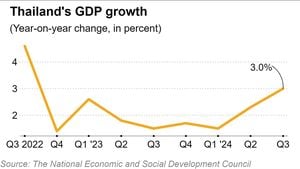Elon Musk, the CEO renowned for his ventures with Tesla and SpaceX, sent shockwaves through the federal workforce on February 22, 2025, with his ultimatum to government employees, demanding they justify their productivity or face job loss. This unusual move, ostensibly part of his unofficial role leading the Department of Government Efficiency (DOGE), has been met with fierce backlash from numerous government agencies and officials, signaling potential power struggles within Washington, D.C.
Musk's email, sent to approximately 2 million federal workers, came with the directive: "Consistent with President @realDonaldTrump’s instructions, all federal employees will shortly receive an email requesting to understand what they got done last week. Failure to respond will be taken as a resignation." Employees were instructed to submit five bullet points detailing their accomplishments from the previous week by 11:59 PM EST on February 24, 2025. The abrupt nature of the request left many confused and questioning its legality, particularly since Musk has no formal authority over federal operations.
The response from the FBI was sharp and clear. Newly sworn-in director Kash Patel quickly sent out a memo advising staff to ignore Musk’s inquiry, asserting, "FBI personnel may have received an email from OPM requesting information. The FBI, through the Office of the Director, is in charge of all of our review processes and will conduct reviews in accordance with FBI procedures." This clear pushback raised eyebrows, as it indicated tension between the Musk-led initiatives and established federal protocols.
Similar resistance came from the State Department. Ambassador Tibor Nagy assured staff there was no obligation to report their activities beyond the established chain of command. “The State Department will respond on behalf of the Department,” he said, reinforcing the notion of departmental autonomy against external pressures. Even within the Department of Justice, leaders were cautioning employees to refrain from replying, fearing potential ethics violations.
Despite the backlash, not all reactions were unified. Some Trump loyalists within the federal workforce openly encouraged compliance with Musk’s demands. U.S. Attorney Ed Martin tweeted support for Musk’s initiatives, saying, “DOGE and Elon are doing great work! History. We are happy to participate.” This dichotomy of responses—where some embraced the new order and others firmly resisted—foreshadows brewing power dynamics within the federal government.
Senator Tina Smith didn’t hold back her disdain for Musk’s ultimatum. On social media, she tagged Musk with scathing criticism: “This is the ultimate d boss move from Musk – except he isn’t even the boss, he’s just a d.” Smith encapsulated the sentiment of countless federal employees with her observation, lamenting, “I bet a lot of people have had an experience like this with a bad boss - there’s an email in your inbox on Saturday night saying, ‘Prove to me your worthiness by Monday or else.’ I’m on the side of the workers, not the billionaire asshole bosses.”
The email’s distribution also reached employees across varied agencies—including the Consumer Financial Protection Bureau and the National Oceanic and Atmospheric Administration—raising practical questions about how underfunded staff would manage such demands. Air traffic controllers, who are already facing intense workloads, received similar alerts, with their union voicing concerns about how they would be able to respond amid current operational strains.
Responses to Musk’s ultimatum highlight not only the immediate confusion among employees but also the larger issue of authority and accountability within government offices. Critics argue it demonstrates how the influence of private sector leaders like Musk can upend established governmental procedures and potentially overwhelm agencies, often already struggling with limited resources.
At the Pentagon, reactions were mixed. Some officials found humor within the chaos, with one defense employee reportedly sharing memes and gifs reflecting disbelief at the email's tone. Meanwhile, others expressed concern over the seriousness of the ultimatum and its potential ramifications on workforce morale and productivity.
Looking at the broader picture, Musk’s ultimatum—and its fallout—illustrates the sweeping changes the Trump administration is attempting to implement under the guise of efficiency. Critics remain wary, pointing to signs of disarray and bureaucratic tensions this unprecedented move might engender.
The email's fallout will likely extend beyond mere confusion, possibly leading to significant structural changes within various federal agencies if Musk’s efforts align with Trump’s agenda to streamline government spending and decrease workforce size. The notion of resignations due to lack of responses raises questions about due process and workers' rights, which could provoke legal challenges.
Elon Musk's actions, representing the intersection of private enterprise and government duty, evoke memories of contentious labor dynamics across various sectors. The resistance from federal workers presents the latest front in the struggle for job security amid political winds shifting against the traditional public service ethos.
While many observers and critics of the situation recognize the absurdity of demanding performance reports under such pressure, supporters of these policies might tout them as necessary for modernizing and improving governmental efficacy. The coming days will determine whether internal agency responses evolve toward compliance or resistance as federal employees navigate this unprecedented ultimatum.



